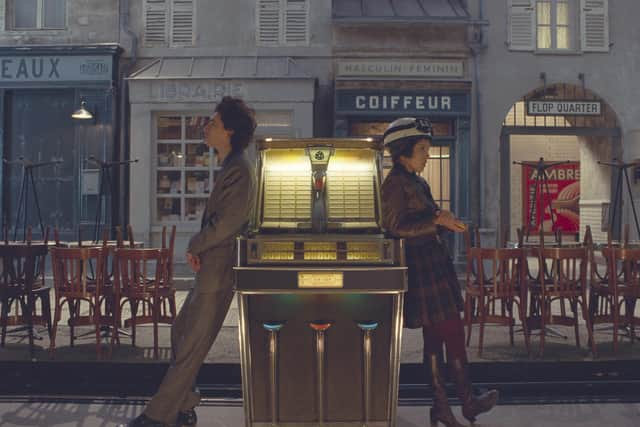Film reviews: Dune | The French Dispatch


Dune (12A) **
The French Dispatch (15) ***
It’s hard to overstate how big, bold and boring the new version of Dune is. Arriving in cinemas a year late, it’s a film so ostentatiously grand that after what seems like five hours (but really just two-and-a-half) it confidently ends in the dreariest way imaginable: with a character who’s barely been introduced announcing “this is just the beginning” while a bunch of other people trudge off deeper into the desert.
How compelling you’ll find that journey will likely depend on the degree to which you’ve been dreaming of a faithful rendering of Frank Herbert’s doorstopper of a source novel. All set-up and no pay-off, Villeneuve’s Dune is certainly an imposing exercise in world-building, going into granular detail about how moisture suits work on the desert planet of Arrakis and dumping reams of exposition on us by having characters sit around learning Wikipedia-style factoids about the world of Dune from pocket projectors referred to at one point as “film books” (a sly reference, perhaps, to what this film is trying to be). It certainly not in a rush to get anywhere fast — and yet its contemplative air is undercut by the groaning familiarity of its plot, which is set against the backdrop of a trade war to control a naturally occurring hallucinogen called Spice and follows a sullen youth (Timothée Chalamet’s Paul Atreides) coming to terms with the fact that his burdensome mind powers might make him the prophesied saviour of a universe threatened by a nefarious galactic empire.
Advertisement
Hide AdThat George Lucas plundered aspects of Dune’s 1965 source novel when developing Star Wars is no secret, but Villeneuve seems determined to remind us of that fact, doubling down on the similarities with a solemnity that demands we take it all terribly seriously. The problem is that Star Wars did such a comprehensive job of filleting Dune and making something exciting out of its dense mythology that Villeneuve’s approach is like the cinematic equivalent of an academic with a slide show sniffily outlining how Dune got there first. Well, ok, so it got there first, but all that means now is that we’re already ahead of the story and Villeneuve’s response is to spin things out with leaden dialogue outlining the allegorical significance of its colonialism-themed plot while delivering epic visuals that overwhelm what little drama exists in Paul’s awakening as yet another white saviour (the hinted-at complexities of this awakening have been deferred to part two). It doesn’t help that the revolving-door casting policy of franchise filmmaking means that it’s filled with the same faces from those other mega-blockbusters you’ve seen recently. Oscar Isaac, Rebecca Ferguson, Josh Brolin, Jason Momoa, Dave Bautista and Stellan Skarsgård are all on hand to provide some aggregate star power to prop up Chalamet, who’s better in smaller movies where he doesn’t have to compete with giant sandworms or Hans Zimmer’s electro bagpipe score.
As it happens, Chalamet pops up again Wes Anderson’s The French Dispatch, another auteur-driven movie with an over-emphasis on production design. That’s par for the course with Anderson’s films, though; their diorama aesthetic is part of their charm, but it can also make them seem a little insular, which is the case with this esoteric ode to the golden age of magazine journalism and the exacting standards of the New Yorker in particular.
Set in the fictional, amusingly named French town of Ennui-sur-Blasé, the film tells the story of the eponymous publication and its recently deceased owner, Arthur Howitzer Jr (Bill Murray), ostensibly by adapting its final issue into a portmanteau movie comprised of articles by four of its star writers. Up first is Owen Wilson’s cycling correspondent, Herbsaint Sazerac, whose impossible-to-verify history of Ennui offers a little Goings on About Town-style tone-setter. Then comes Tilda Swinton’s art critic, JKL Berensen; she’s on hand to deliver a lecture recounting her magazine profile of a local criminal turned art-world superstar (he’s played by Benicio Del Toro). Veteran reporter Lucinda Krementz (Frances McDormand) is next, with a long piece about student radicals and her sexual involvement with their young leader (Chalamet). Finally there’s Jeffrey Wright as a James Baldwin-esque writer whose life-saving involvement with the magazine is woven into an elaborate culinary themed story involving a kidnapping and a revered chef.


Shot largely in monochrome, the film pays formalistic tribute to the way talented writers can bring stories vividly to life in print, with Anderson framing each section a little differently to reflect the wildly eccentric personalities of his protagonists. What struggles to come through, however, is any genuine emotion or passion. McDormand comes closest to cracking the film’s arch veneer, but Anderson seems so petrified of connecting with anything real (he even has Murray’s character’s mantra of “No Crying” stencilled above Howitzer’s office door) that it’s hard to share in his heightened sense of nostalgia for this bygone era.
A message from the Editor:
Thank you for reading this article. We're more reliant on your support than ever as the shift in consumer habits brought about by coronavirus impacts our advertisers.
If you haven't already, please consider supporting our trusted, fact-checked journalism by taking out a digital subscription at https://www.scotsman.com/subscriptions